As important as books are to the development of civilization, they certainly are a polarizing thing. I mean, there are some people out there who absolutely refuse to read anything other than subtitles for TV shows, where people speak English but you just can’t understand them. On the opposite end of the spectrum, there are other people that may not realize televisions were invented and just read ALL OF THE TIME. I’d like to think of myself as being somewhat in the middle, though if I’m being honest, I can’t remember the last time I held a paper book in my hand and read the whole thing…
But, that doesn’t mean I hate words! Words are fun. I like to learn new words that seem completely random and try to throw them into conversations to confuse people. I guess all that SAT preparation from high school just never wore off. As a result of this affinity, I am a pretty big fan of board games that are based on words. Now, as you read that sentence, the game Scrabble probably burst into your mind with an intense fury. But there are other games that allow you to take that diction of yours and throw it around a little bit.
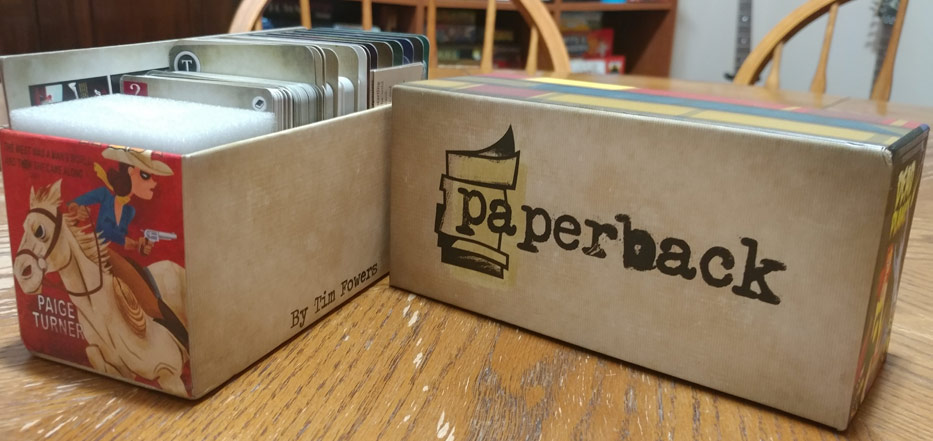
Paperback by Tim Fowers is one of those games. Released back in 2014, I’ve often described it as Scrabble meets Dominion, in that it’s a deck building game in which you use cards that represent letters to spell out words to get money and points. At the beginning of the game, each player starts off with a deck of ten cards, five of which have letters (R, S, T, L, and N) and five of which are wild. You’ll deal yourself a hand of five of these cards, and then come up with a word that utilizes the letters that are in your hand. Now you may try to show off your word knowledge here, but that won’t necessarily help you win the game, as you are trying to spell out words that are the most valuable.
Letters = Money
Valuable words? What does that even mean? Well, each of the cards has a point value which represents money. You add up the point values of the letters in the word that you played on your turn, and that tells you how much money you have to spend on the round. Once you’ve made your purchase, you discard the cards you played and those that were left in your hand, then deal yourself five new cards and do it all over again on your next turn.
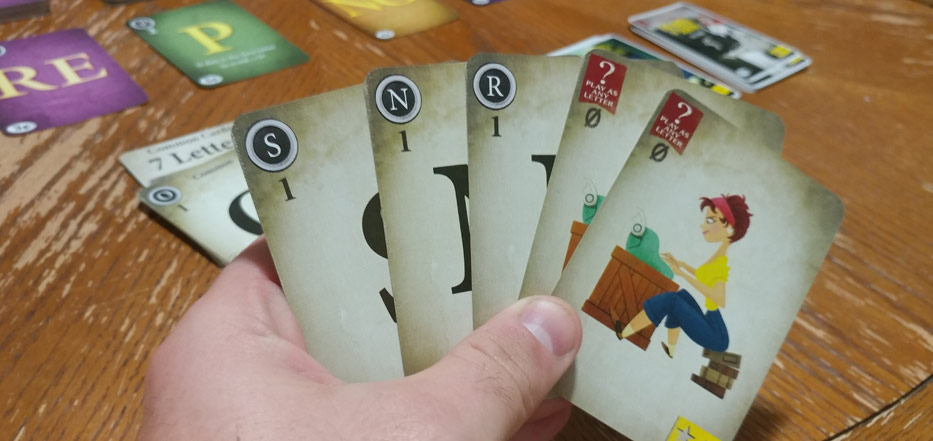
So, what would you buy? Well, more letters, of course! The offer, as it is called, includes piles of cards that cost anywhere from two to ten cents, and there are two letters available for sale in most of the piles. These new letters are not only worth more points when you play them, but they also have some special abilities that can help you in a variety of ways. Some cards allow you to draw up to a larger hand for the next round. Other cards give you more money if you satisfy certain conditions, like playing that letter next to a wild or playing it at the beginning of the word. Still others allow you to attack your opponents, forcing them to discard some of their hand or preventing them from playing wilds in the next round.
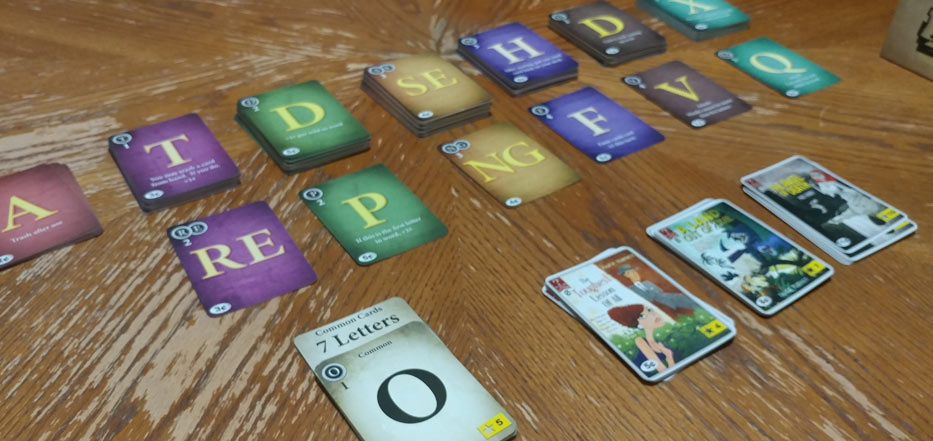
Powerful letters are good, but they’re not going to get you any points. In addition to the letter cards, there are Fame Cards, which look like the cover of a cheesy paperback novel. These are the major way that you gain fame points, which serve as the scoring system in the game. There are four different cards that cost between five and seventeen cents, with the more expensive cards being worth more points. This setup leads to some important decisions as you play the game, because these Fame Cards have to stay in your deck as you continue play. So if you decide to load up on low value cards, they will keep coming back as wild cards that don’t give you any extra money, so you’ll have a tough time getting to those higher value cards later. However, if you wait too long just for the more expensive cards, other players might swoop in and clear out two of the Fame Card types, which brings the game to an end.
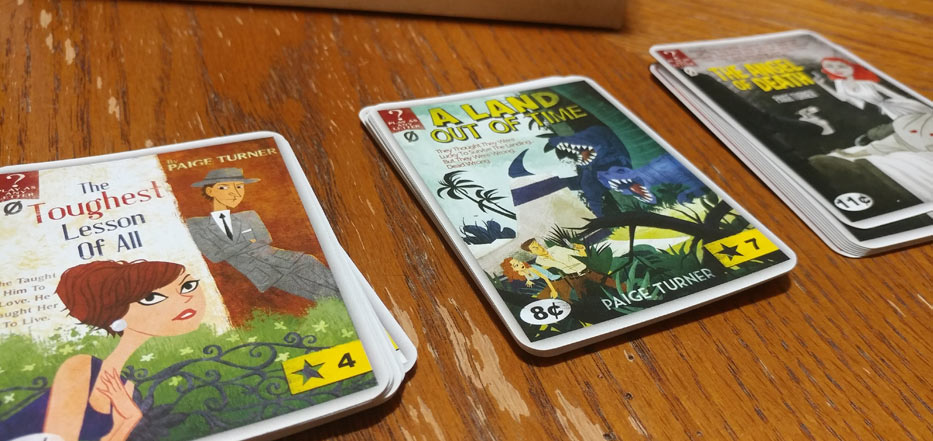
Fame Cards aren’t the only way you can get points, though. There is also a set of common cards which have a vowel that everyone can use while they create their words. These cards are actually obtainable if you spell out lengthy words. The first player to hit seven letters in a word, for example, will win the first common card, which is added to their deck and is worth points at the end of the game. A new common card is then revealed, and a player must spell a word with eight letters in it to get that card. Clearing the common card deck is another way that the game can come to an end, thus providing players with different avenues and approaches to the game and to victory.
A Different Type of Deck Builder
Deck builders have covered a variety of genres in just a few short years. You can fight against evil super villains or maybe Death Eaters. Maybe you’re working to survive an earth after horrible climate change, or maybe you’re fighting against vampires and other forces of darkness. They always seem so intense and keep you on the edge of your seat, but Paperback is different. I mean, you’re spelling words – it’s hard to get your adrenaline going for that. There is definitely some strategy and timing involved in the game, and I think it can be a little hard to master. As in many deck builders, there comes a point in the game where you have to change from card collecting to point collecting. Personally, I never figure out when that is. I just usually end up buying whatever card seems to be the best out on the market, whether it works well with the rest of my deck or not. But that seems to be what my opponents do, too, so it all ends up okay, and we still have a great time. So I think Paperback can work for the intense and the laid back alike.
I do wonder what would happen if I spent more time focusing on a strategy for the game, though. I wonder if it would resolve some of my concern of the overly long runtime, as Paperback has seemed to never end in some of my games. I also sometimes feel like I never quite have a full understanding of my hand, and I just do my best in each hand instead of thinking what could happen from turn to turn. Maybe as I keep playing, I can try a little harder and see what happens. I think I’ll just sit back and enjoy myself with Paperback, spelling words with my friends and trying to win, but mostly having a good time. And hey, why ruin a good thing?
You can pick up a copy of Paperback at Fowers Games today!
Highs
- A great combination of word games and deck builders
- Fantastic variety in gameplay options
Lows
- Can be difficult to figure out exactly how to best construct your hand
- Sometimes it takes FOREVER to end the game
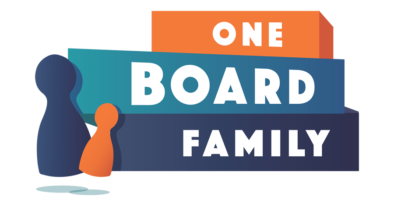
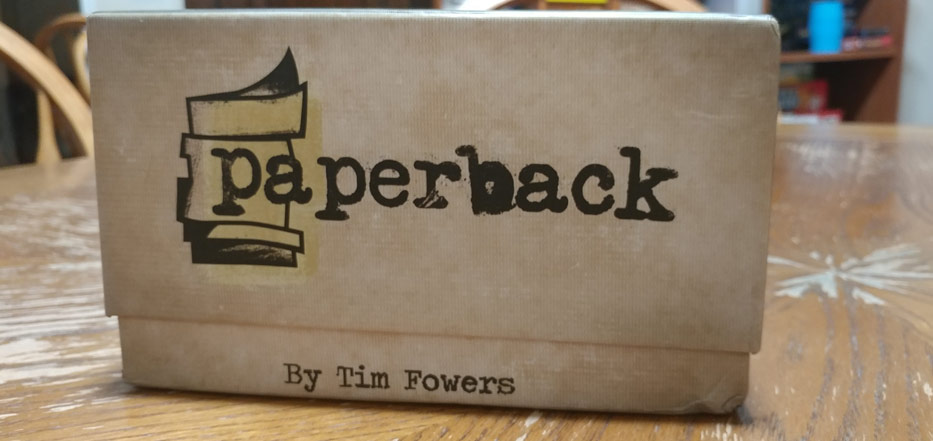
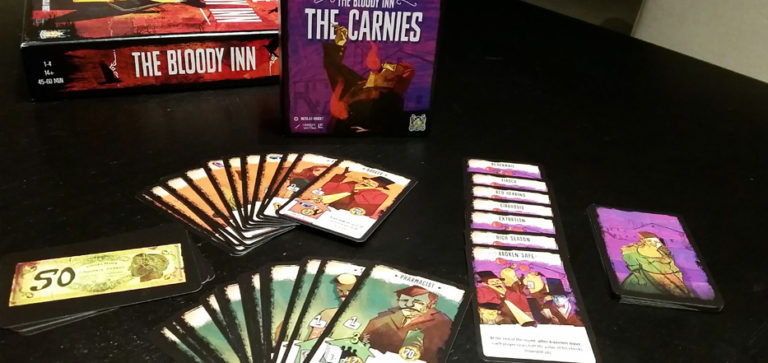
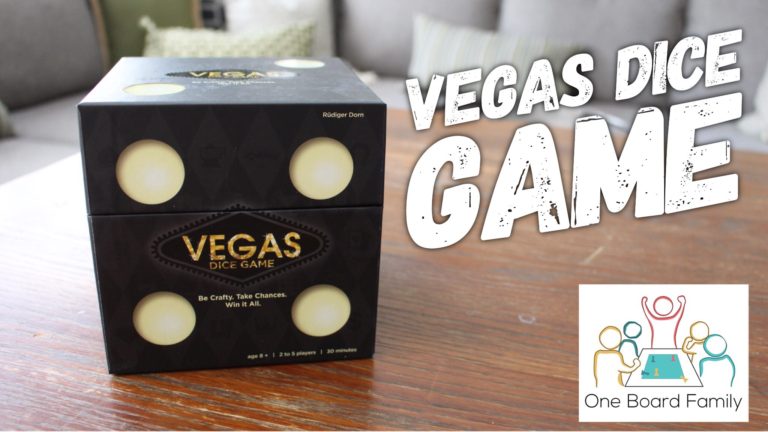
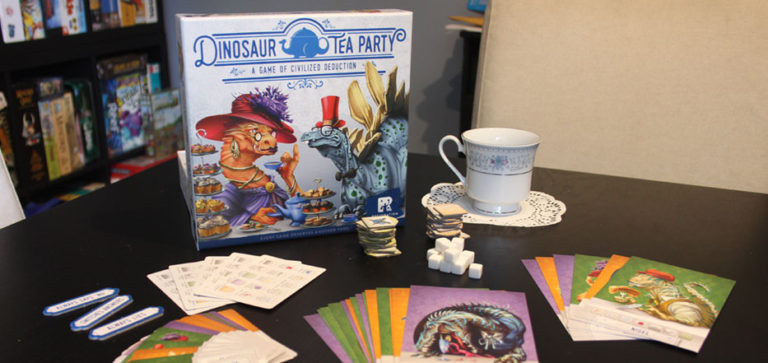
[…] a world where Letter Tycoon, Word Domination, Hardback, and (one of my favorites) Paperback all exist, where does Movable Type fit in? All of those games have also come out in the past few […]
[…] prefer to play any other type of game. There are so many word games out there to choose from, like Paperback, Moveable Type, Wordsy…games that can scratch the itch of any word game enthusiast. So how […]
[…] muscles. Ric has been our resident “word game” reviewer. Over the years games like Paperback, Movable Type and Composition are excellent ways to flex spelling skills with the family. Paperback […]